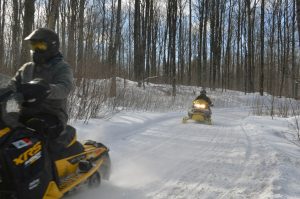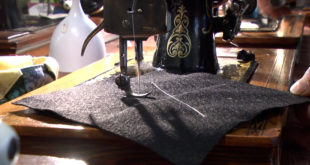
The Michigan Department of Natural Resources is urging snowmobilers not to use loud exhaust pipes or cans and is reminding riders that laws against loud machine violations will be enforced strictly.
“We are continuing to get numerous complaints from the public about loud sleds,” said Ron Yesney, Upper Peninsula trails coordinator for the DNR’s Parks and Recreation Division in Marquette. “We’re looking to riders to help us curb this ongoing problem.”
Several of these complaints have led to private property owners revoking their permission to route snowmobile trails across their land.
“This diminishes our trail connectivity and decreases riding opportunities for everyone,” said John Pepin, DNR deputy public information officer. “In areas without trails, loud sleds are still a source of resident complaints.”
Under Michigan law, the muffler on a snowmobile must be in good working order and, when in constant operation, noise emission cannot exceed 88 decibels at 13.1 feet, as measured using the 2004 Society of Automotive Engineers standard J2567 for a stationary snowmobile manufactured after July 1, 1980.
The penalty for violating sound levels for snowmobiles is a civil infraction, carrying fines of over $200. Snowmobiles may be impounded.
“Enforcement efforts are necessary, but our long-term goal is to gain voluntary compliance from riders,” Yesney said. “Mountain, trail and race cans are strongly discouraged. Loud sleds give snowmobilers a bad name and give those opposed to motorized sports a voice.”
DNR conservation officers are seeing increased use of “trail can” exhausts.
“These are cans that are designed to pass a decibel test, but they are still very loud and undermine our efforts to secure trail easements and provide opportunities for snowmobilers to ride,” said Lt. Ryan Aho, a district law supervisor in Marquette. “Most trail cans will pass a decibel test if new, but may fail after a few thousand miles.”
Whether riding on or off trails, the DNR urges snowmobilers and dealers to use stock or original equipment manufacturer exhausts.
“Many thousands of hours of volunteer effort go into developing and maintaining Michigan’s snowmobile program,” Yesney said. “It only takes one sled with a loud exhaust to ruin riding opportunities for many.”
Hand in hand with complaints about loud sled violations are private property trespass complaints. The DNR suggests off-trail riders “know before they go” making sure the property they will be riding on is public.
“Riders who decide to trespass compromise the goodwill landowners have extended to the DNR, snowmobilers and trail groups and sponsors,” Yesney said. “Trespassing is another serious problem that oftentimes leads to landowner permissions being pulled and our being forced to shut down trail segments as a result.”
A committee was formed recently to develop information indicating exactly where it is legal to ride off-trail. The goal is to eventually have off-trail riding opportunities signed and mapped. Until these developments occur, it is crucial that snowmobilers ensure they are off-trail riding only on public lands.
“Whether snowmobiling on trails or off, we all need to work together for the greater good to prevent trespassing and loud sled violations from occurring,” Yesney said. “Taking loud cans or pipes off your sled and staying on the trail helps everyone.”
For more information on snowmobiling in Michigan, including current laws and regulations, go to michigan.gov/snowmobiling.
 Keweenaw Report Your Source for Local News and Sports
Keweenaw Report Your Source for Local News and Sports





